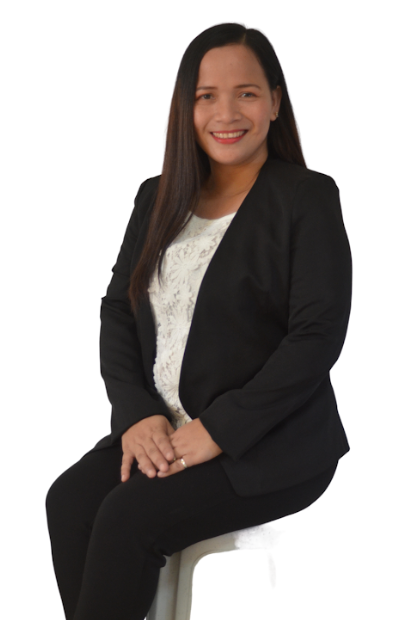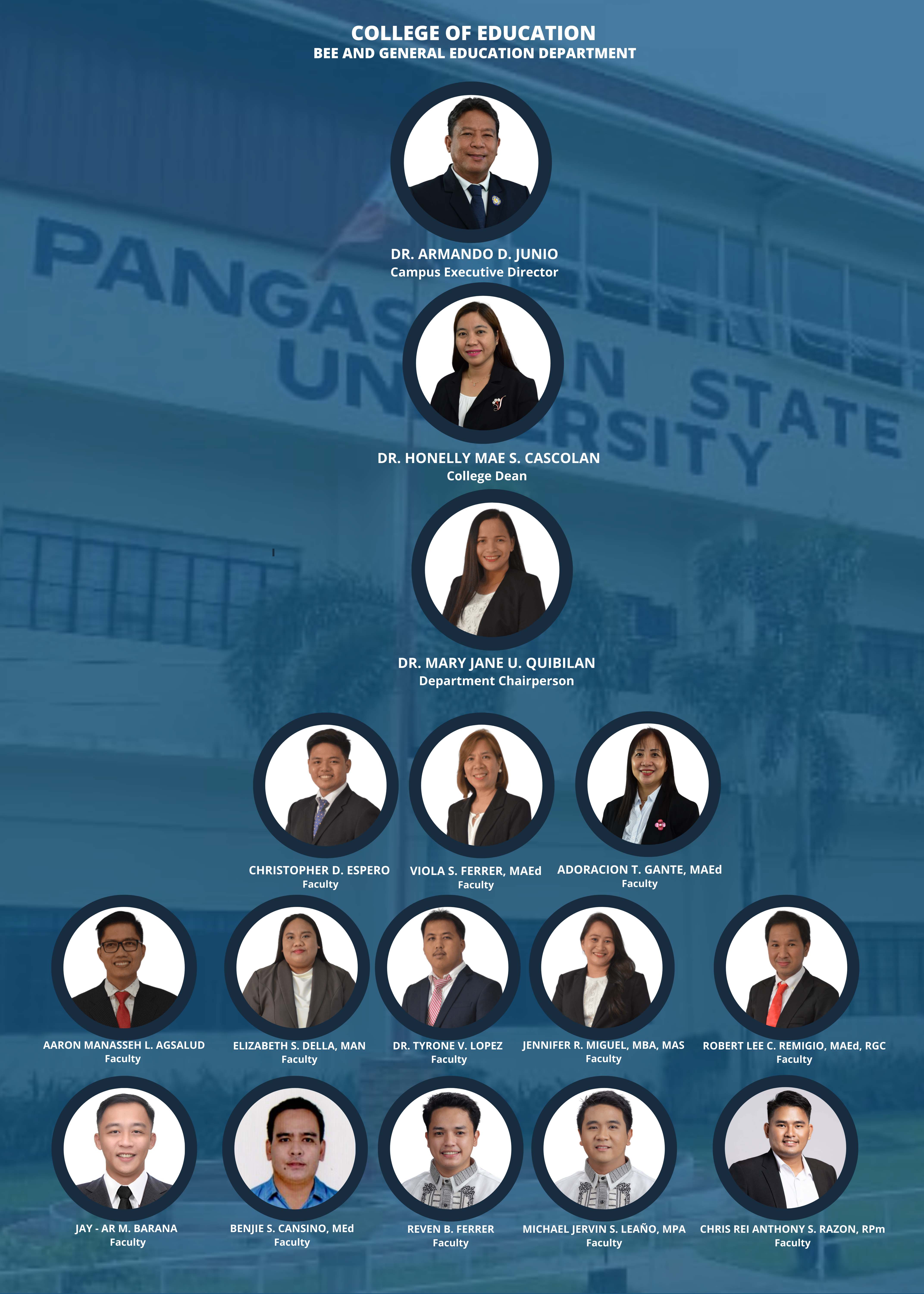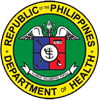
Welcome to the Bachelor of Elementary Education Department!
Greetings! Pangasinan State University Asingan campus (PSU AC) is deeply committed to achieving excellence in technical, management, education & research and assessed the success and leadership of its programs offered using the highest standards of quality, innovation, and creativity.
The victorious journey of Bachelor of Elementary Education program of PSU AC in achieving the award of Level 3 Accredited by the Accrediting Agency of Chartered Colleges and Universities in the Philippines (AACCUP) strived more in imparting excellence in the quality education we provide, incorporating greater space for creativity, innovation, attainment of skills and excellence in education. The progressive evolution continues and we are so proud that on the process of improvement, there are producing of topnotchers, enabling employability to the graduates and developing future great educators.
And this journey offers a clear and unwavering goal: enabling individuals – our BEEd students no matter where they are born and what circumstances they are in – to have access to the resources and opportunities and to reach their full potential and become globally and innovative teachers in the making. The students develop the knowledge, skills and dispositions crucial in the formation of effective, committed, trailblazing and student-centered educators who possess an asset based mindset. This is an ambitious and perhaps aspirational goal I believe and it is our responsibility to use these gifts to catalyze a positive impact in the world—especially where it is needed the most.
We are indeed blessed with immense competence and talent among our faculty members , staff, and students and with unique power to convene the brighter minds exposed to a culture of collaborative inquiry necessary in the preparation of teachers who can address the needs of the 21st century learners.
Dr. Mary Jane U. Quibilan
Department Chair
Program Description
Education is necessary to everyone.It can be classified as one of the basic needs of a person and his community. In this changing world, education is the key to become successful. Pangasinan State University- Asingan Campus’ guiding philosophy, education is geared towards better citizenship and livelihood.It offers quality education to meet the needs of the community of highly competent individuals who would contribute and uplift the quality of education and the community. The program, Bachelor of Elementary Education (BEEd) offers high quality education not only in meeting the need of the community upon providing competent individuals, but also supporting studies upon uplifting the quality education of the country. In instruction, the campus has high caliber faculty members who are competent and knowledgeable upon training the student-teachers to be at their best in-campus and off campus. In research, the students and faculties have existing collaborative researches that would contribute to the betterment of the department and the campus. There are planned activities that would promote research involvement between faculty members and students. In extension, the program promotes connection to other agencies/ departments to hone its students. And as a result, “Story Telling” among different adopted schools was born. The faculty members as well as the student-teachers actively involved on this story telling activities that promote literacy enhancement among young learners in different school partners. The program continuously produce competent educators upon meeting the needs of the academe and other interested party in the national and international education community.
Program Objectives
The intent of the BEEd program is to produce teachers who are able to meet the demands of the teaching profession, both local and national area and in the ASEAN region. It has the following objectives: (BEEd 2021 Curriculum with CHED Contents Notation)
- Demonstrate through institutional mechanisms, systems, policies, and processes which are reflective of transparency, equity, participatory decision making, and accountability;
- Engage in relevant, comprehensive and sustainable development initiatives through multiple perspectives in decisions and actions that build personal and professional credibility and integrity.
- Set challenging goals and tasks with determination and sense of urgency which provide continuous improvement and producing quality outputs leading to inclusive growth;
- Exhibit life-long learning and global competency proficiency in communication skills, inter/interpersonal skills, entrepreneurial skills, innovative mindset, research and production initiatives and capability in meeting the industry requirements of local, ASEAN and international human capital market through relevant and comprehensive programs;
- Display, socially and environmentally responsive organizational culture, which ensures higher productivity among the university constituents and elevate the welfare of the multi-sectoral communities and;
- Practice spiritual values and morally upright behavior which promote and inspire greater harmony to project a credible public image.
Organizational Chart

Employment Opportunities
|
|
|
Program Outcomes
|
Program Outcomes |
Performance Indicator |
|
Articulate the rootedness of education in philosophical, socio-cultural, historical, psychological, and political contexts (PO 12) Demonstrate mastery of subject matter/discipline. (PO 13) Demonstrate in-depth understanding of the diversity of learners in various learning areas. (PO 20) |
Identify various types of learners and provide them with appropriate, culturally-relevant learning activities and experiences. |
|
Demonstrate mastery of subject matter/discipline. (PO 13) Facilitate learning using a wide range of teaching methodologies and delivery modes appropriate to specific learners and their environments. (PO 14) Develop innovative curricula, instructional plans, teaching approaches, and resources for diverse learners. (PO 15) Manifest skills in communication, higher order thinking and use of tools and technology to accelerate learning and teaching. (PO 23) |
Develop and utilize relevant materials that match the learners’ learning styles, goals and culture. |
|
Facilitate learning using a wide range of teaching methodologies and delivery modes appropriate to specific learners and their environments. (PO 14) Develop innovative curricula, instructional plans, teaching approaches, and resources for diverse learners. (PO 15) Demonstrate in-depth understanding of the diversity of learners in various learning areas. (PO 20) Manifest meaningful and comprehensive pedagogical content knowledge (PCK) of the different subject areas. (PO 21) |
Select instructional strategies for the development of learners’ critical and creative thinking skills. |
|
Set challenging goals and tasks with determination and sense of urgency which provide continuous improvement and producing quality outputs leading to inclusive growth. (PO 3) Demonstrate mastery of subject matter/discipline. (PO 13) Pursue lifelong learning for personal and professional growth through varied experiential and field-based opportunities. (PO 19) Demonstrate in-depth understanding of the diversity of learners in various learning areas. (PO 20) |
Utilize developmentally appropriate activities in teaching the different learning areas. |
|
Demonstrate mastery of subject matter/discipline. (PO 13) Apply skills in the development and utilization of ICT to promote quality, relevant, and sustainable educational practices. (PO 16) Demonstrate in-depth understanding of the diversity of learners in various learning areas. (PO 20) |
Utilize appropriate technologies to achieve the learning outcomes. |
|
Articulate and discuss the latest development in the specific field of practice. (PO 7) Work effectively and independently in multi-disciplinary and multi-cultural teams (PO 9) Articulate the rootedness of education in philosophical, socio-cultural, historical, psychological, and political contexts. (PO 12) Facilitate learning using a wide range of teaching methodologies and delivery modes appropriate to specific learners and their environments. (PO 14) Develop innovative curricula, instructional plans, teaching approaches, and resources for diverse learners. (PO 15) |
Apply theories of learning in designing learning-teaching experiences. |
|
Articulate and discuss the latest development in the specific field of practice. (PO 7) Demonstrate mastery of subject matter/discipline. (PO 13) Manifest meaningful and comprehensive pedagogical content knowledge (PCK) of the different subject areas. (PO 21) |
Explain subject matter content, accurately and comprehensively. |
|
Articulate and discuss the latest development in the specific field of practice. (PO 7) Develop innovative curricula, instructional plans, teaching approaches, and resources for diverse learners. (PO 15) Manifest meaningful and comprehensive pedagogical content knowledge (PCK) of the different subject areas. (PO 21) |
Relate current content with past and future lessons. |
|
Work effectively and independently in multi-disciplinary and multi-cultural teams (PO 9) Develop innovative curricula, instructional plans, teaching approaches, and resources for diverse learners. (PO 15) Demonstrate a variety of thinking skills in planning, monitoring, assessing, and reporting learning processes and outcomes. (PO 17) Contribute to the generation of new knowledge by participating in various research and development projects. (PO 26) |
Integrate recent developments in education and in the specific field to enrich learning. |
|
Demonstrate through institutional mechanisms, system, policies, and processes which are reflective of transparency, equity, participatory decision making, and accountability. (PO 1) Engage in relevant, comprehensive, and sustainable development initiatives through multiple perspectives in decisions and actions that build personal and professional credibility and integrity. (PO 2) Set challenging goals and tasks with determination and sense of urgency which provide continuous improvement and producing quality outputs leading to inclusive growth. (PO 3) Exhibit life-long learning and global competence proficiency in communication skills, intra/interpersonal skills, entrepreneurial skills, innovative mindset, research and production initiatives and capability in meeting industry requirements of local, ASEAN and international human capital market through. (PO 4) |
Provide examples from real life to make learning meaningful. |
|
Demonstrate mastery of subject matter/discipline. (PO 13) Facilitate learning using a wide range of teaching methodologies and delivery modes appropriate to specific learners and their environments. (PO 14) Develop innovative curricula, instructional plans, teaching approaches, and resources for diverse learners. (PO 15) Apply skills in the development and utilization of ICT to promote quality, relevant, and sustainable educational practices. (PO 16) Pursue lifelong learning for personal and professional growth through varied experiential and field-based opportunities. (PO-19) |
Utilize appropriate teaching-learning methods and technology for specific subject matter content. |
|
Exhibit life-long learning and global competence proficiency in communication skills, intra/interpersonal skills, entrepreneurial skills, innovative mindset, research and production initiatives and capability in meeting industry requirements of local, ASEAN and international human capital market through relevant and comprehensive programs. (PO 4) Articulate the rootedness of education in philosophical, socio-cultural, historical, psychological, and political contexts. (PO 12) Pursue lifelong learning for personal and professional growth through varied experiential and field-based opportunities. (PO-19) Manifest meaningful and comprehensive pedagogical content knowledge (PCK) of the different subject areas. (PO 21) |
Keep abreast with educational issues, trends, and practices vis-à-vis local and global context to provide relevant learning experiences. |
|
Apply skills in the development and utilization of ICT to promote quality, relevant, and sustainable educational practices. (PO-16) Demonstrate a variety of thinking skills in planning, monitoring, assessing, and reporting learning processes and outcomes. (PO 17) Utilize appropriate assessment and evaluation tools to measure learning outcomes. (PO 22) |
Design authentic assessment, evaluation instruments and alternative assessment tools. |
|
Apply skills in the development and utilization of ICT to promote quality, relevant, and sustainable educational practices. (PO-16) Demonstrate a variety of thinking skills in planning, monitoring, assessing, and reporting learning processes and outcomes. (PO 17) Utilize appropriate assessment and evaluation tools to measure learning outcomes. (PO 22) |
Interpret assessment results and use these to improve learning and teaching. |
|
Apply skills in the development and utilization of ICT to promote quality, relevant, and sustainable educational practices. (PO 16) Utilize appropriate assessment and evaluation tools to measure learning outcomes. (PO 22) |
Keep accurate and updated records of the learners’ performance using technology tools where feasible and appropriate. |
|
Utilize appropriate assessment and evaluation tools to measure learning outcomes. (PO 22) |
Provide timely feedback of assessment results to parents and other stakeholders. |
|
Exhibit life-long learning and global competence proficiency in communication skills, intra/interpersonal skills, entrepreneurial skills, innovative mindset, research and production initiatives and capability in meeting industry requirements of local, ASEAN and international human capital market through relevant and comprehensive programs. (PO 4) Facilitate learning using a wide range of teaching methodologies and delivery modes appropriate to specific learners and their environments. (PO 14) Demonstrate a variety of thinking skills in planning, monitoring, assessing, and reporting learning processes and outcomes. (PO 17) Manifest skills in communication, higher order thinking and use of tools and technology to accelerate learning and teaching. (PO 23) |
Demonstrate skills in creative and critical thinking, logical reasoning, problem solving, and decision making in various classroom situations. |
|
Demonstrate through institutional mechanisms, system, policies, and processes which are reflective of transparency, equity, participatory decision making, and accountability. (PO 1) Set challenging goals and tasks with determination and sense of urgency which provide continuous improvement and producing quality outputs leading to inclusive growth. (PO 3) Exhibit life-long learning and global competence proficiency in communication skills, intra/interpersonal skills, entrepreneurial skills, innovative mindset, research and production initiatives and capability in meeting industry requirements of local, ASEAN and international human capital market through relevant and comprehensive programs. (PO 4) Practice professional and ethical teaching standards sensitive to the changing local, national, and global realities. (PO 18) Pursue lifelong learning for personal and professional growth through varied experiential and field-based opportunities. (PO 19) |
Create learning experiences that develop the learners’ higher order thinking skills. |
|
Engage in relevant, comprehensive, and sustainable development initiatives through multiple perspectives in decisions and actions that build personal and professional credibility and integrity. (PO 2) Set challenging goals and tasks with determination and sense of urgency which provide continuous improvement and producing quality outputs leading to inclusive growth. (PO 3) Exhibit life-long learning and global competence proficiency in communication skills, intra/interpersonal skills, entrepreneurial skills, innovative mindset, research and production initiatives and capability in meeting industry requirements of local, ASEAN and international human capital market through relevant and comprehensive programs. (PO 4) Pursue lifelong learning for personal and professional growth through varied experiential and field-based opportunities. (PO 19) Manifest skills in communication, higher order thinking and use of tools and technology to accelerate learning and teaching. (PO 23) |
Provide opportunities that develop the learners’ communication skills. |
|
Apply skills in the development and utilization of ICT to promote quality, relevant, and sustainable educational practices. (PO 16) Manifest skills in communication, higher order thinking and use of tools and technology to accelerate learning and teaching. (PO 23) |
Use tolls and technology to enhance learning and teaching. |
|
Display, socially and environmentally responsive organizational culture, which ensures higher productivity among the university constituents and elevates the welfare of the multi-sectoral communities. (PO 5) Practice spiritual values and morally upright behavior which promote and inspire greater harmony to project a credible public image. (PO 6) Act in recognition of professional, social, and ethical responsibility. (PO 10) Demonstrate positive attributes of a model teacher, both as individual and as a professional. (PO 24) |
Act according to the norms of the teaching profession in dealing with students, parents, colleagues and other stakeholders. |
|
Practice spiritual values and morally upright behavior which promote and inspire greater harmony to project a credible public image. (PO 6) Demonstrate positive attributes of a model teacher, both as individual and as a professional. (PO 24) |
Manifest positive personal and professional qualities of a teacher. |
|
Display, socially and environmentally responsive organizational culture, which ensures higher productivity among the university constituents and elevates the welfare of the multi-sectoral communities. (PO 5) Practice spiritual values and morally upright behavior which promote and inspire greater harmony to project a credible public image. (PO 6) Demonstrate positive attributes of a model teacher, both as individual and as a professional. (PO 24) |
Observe integrity and professionalism in handling issues, conflicts and controversies related to student’s welfare as well as parent’s, and community concerns. |
|
Act in recognition of professional, social, and ethical responsibility. (PO 10) Manifest meaningful and comprehensive pedagogical content knowledge (PCK) of the different subject areas. (PO 21) Manifest a desire to continuously pursue personal and professional development. (PO 25) |
Pursue personal growth and professional development through attendance in seminar-workshops, participation in demo-fests, conducting action research, and other education-related activities. |
|
Display, socially and environmentally responsive organizational culture, which ensures higher productivity among the university constituents and elevates the welfare of the multi-sectoral communities. (PO 5) Work effectively and independently in multi-disciplinary and multi-cultural teams (PO 9) Manifest a desire to continuously pursue personal and professional development. (PO 25) |
Participate actively in the school’s community outreach activities. |


